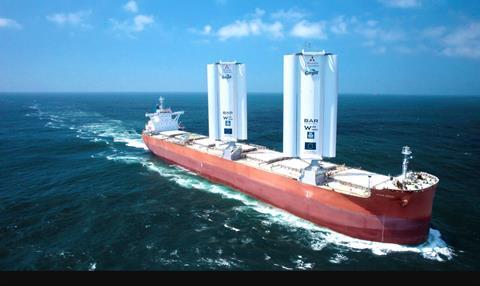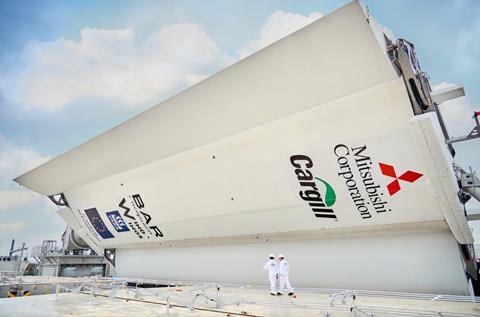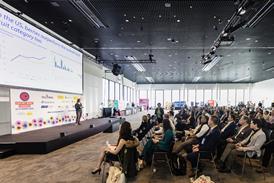Pyxis Ocean fitted with pioneering wind technology sets sail charting new lower-carbon path for global maritime industry

A container ship retrofitted with giant, rigid sails embarked on its maiden voyage yesterday (21 August), testing new technology that could bring cutting-edge wind propulsion to commercial cargo shipping.
Pyxis Ocean, owned by Mitsubishi Corp and chartered by shipping firm Cargill, is the first vessel to be retrofitted with two WindWings – large sails measuring up to 37.5m in height.
Designed by British firm BAR Technologies and manufactured in China by Yara Marine Technologies, the ’wings’ can be fitted to the deck of cargo ships and can cut a vessel’s fuel consumption – and therefore carbon emissions – by up to 30 per cent, Cargill estimates.
The Pyxis Ocean’s maiden voyage, from China to Brazil, will provide the first real-world test of the new technology and an opportunity to assess whether a return to the traditional way of propelling ships could be the way forward for moving cargo at sea.
“The maritime industry is on a journey to decarbonise. It’s not an easy one, but it is an exciting one,” said Jan Dieleman, president of Cargill’s Ocean transportation business.
“At Cargill we have a responsibility to pioneer decarbonising solutions across all our supply chains to meet our customer’s needs and the needs of the planet. A technology like WindWings doesn’t come without risk, and as an industry leader – in partnership with visionary shipowner Mitsubishi Corporation -– we are not afraid to invest, take those risks and be transparent with our learnings to help our partners in maritime transition to a more sustainable future.”
The WindWings project, which is co-funded by the European Union as part of the CHEK Horizon 2020 initiative, could help the container shipping industry meet its net-zero targets by offering a retrofit solution that is capable of decarbonising existing vessels, Dieleman said.
“The performance of the WindWings will be closely monitored over the coming months to further improve their design, operation and performance, with the aim that the Pyxis Ocean will be used to inform the scale-up and adoption across not only Cargill’s fleet but the industry,” he revealed.
BAR Technologies and Yara Marine Technologies are already planning to build hundreds of wings over the next four years, he said, and BAR Technologies is also researching newbuilds with improved hydrodynamic hull forms.
Commenting on the day of the launch, BAR Technologies CEO John Cooper said: “If international shipping is to achieve its ambition of reducing CO2 emissions, then innovation must come to the fore. Wind is a near marginal cost-free fuel and the opportunity for reducing emissions, alongside significant efficiency gains in vessel operating costs, is substantial.
“Today is the culmination of years of pioneering research, where we’ve invested in our unique wind sail technology and sought out a skilled industrialization partner in Yara Marine Technologies, in order to provide vessel owners and operators with an opportunity to realize these efficiencies.”

BAR Technologies was spun out of British competitive sailor Sir Ben Ainslie’s 2017 America’s Cup racing team.
“This is one of the most slow-moving projects we’ve done, but without doubt with the biggest impact for the planet,” Cooper told the BBC, adding that he thinks this voyage will be a turning point for the maritime industry.
“I do predict by 2025 half the new-build ships will be ordered with wind propulsion,” he told the broadcaster. “The reason I’m so confident is our savings: one-and-a-half tonnes of fuel per day. Get four wings on a vessel, that’s six tonnes of fuel saved, that’s 20 tonnes of CO2 saved - per day. The numbers are massive.”
Cooper said a lack of government support in reducing the cost of imported steel prevented the company from manufacturing the WindWings in the UK. “It’s a shame, I’d love to build in the UK,” he told the BBC.






